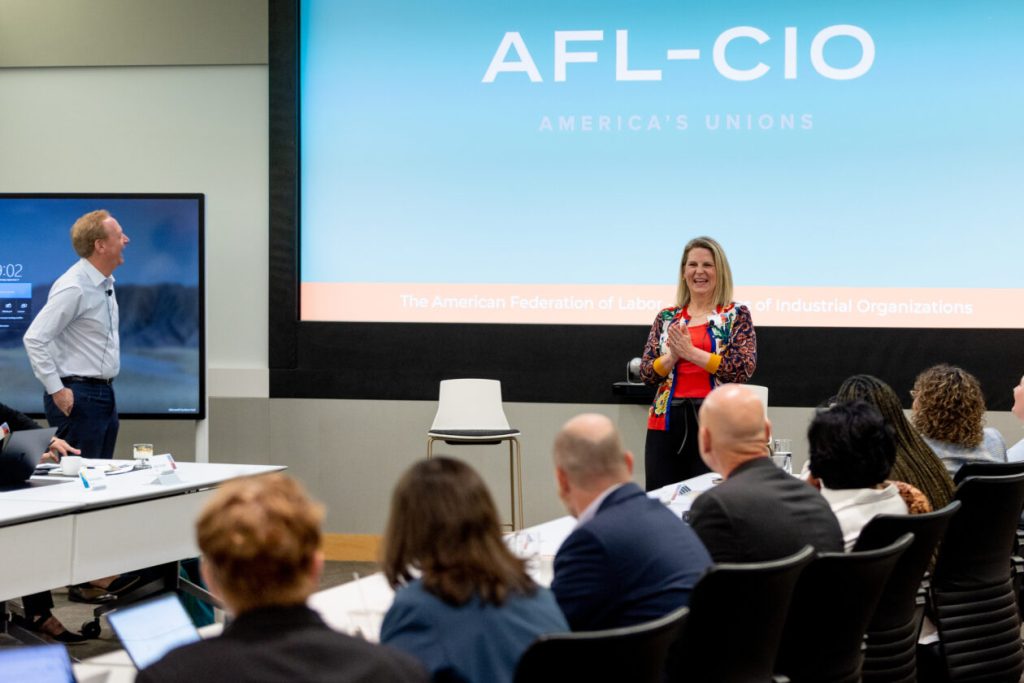Organized labor has made its way into Microsoft headquarters this week with the holding of a two-day AI Labor Summit between AFL-CIO leaders and Microsoft executives. This event, closed to the press and public, reflects Microsoft’s new approach to unions, which includes incorporating feedback from labor unions and their members into the development of artificial intelligence. Notable attendees included leaders from various AFL-CIO unions representing a range of professions. Microsoft has shifted its stance on unions in recent years, now taking a neutral position if any of its employees choose to organize. This commitment to unions sets Microsoft apart from other corporate giants and could potentially work in its favor with regulators and political leaders supportive of organized labor.
Historically, unions have had difficulty gaining ground inside Microsoft, but the company has since changed its approach, particularly following regulatory scrutiny after acquiring Activision-Blizzard. Microsoft has publicly upheld its commitments to unions and pledged to work constructively with any employees who choose to unionize. While the AFL-CIO is engaging with Microsoft this week, other unions have faced challenges with large corporations like Amazon, which has been criticized for its treatment of workers and anti-union practices. Microsoft’s principles released in 2022 acknowledge its employees’ rights to unionize while also emphasizing open dialogue without the need for formal unionization. AFL-CIO President Liz Shuler sees opportunities to organize more Microsoft employees and hopes to apply Microsoft’s example to other tech companies.
Microsoft President Brad Smith highlighted the company’s reliance on unionized workers, including bus drivers, food service workers, and grounds maintenance staff. Many workers on the company’s campus are represented by unions, and Microsoft has good relationships with these unions. The company’s policies also provide benefits like paid time off and parental leave for contracted workers. While unions have seen more success in areas like video games and technical support than in core tech industries, Microsoft and the AFL-CIO have forged an AI partnership to involve workers’ perspectives in AI development. This partnership aims to anticipate the needs of workers and ensure that AI serves people while creating new opportunities and transitions in the workforce.
The AFL-CIO sees the potential for AI and automation to impact various industries, including healthcare where technology could influence workloads and care quality. Microsoft’s collaboration with the American Federation of Teachers is an early example of how AI can automate basic tasks to enhance productivity. The Pew Research Center’s study found that about one-fifth of workers could be affected by AI, with differing impacts on job categories. Workers generally expressed more optimism about AI’s positive impacts than concerns about job loss. Microsoft and the AFL-CIO plan to work through any disagreements to ensure that AI products meet the needs of workers and create new opportunities. The partnership between Microsoft and the AFL-CIO is the first of its kind to focus on AI, indicating a new direction in labor-management relationships within the tech industry.
Overall, Microsoft’s commitment to unions and collaboration with the AFL-CIO signals a shift towards more inclusive and worker-friendly practices within the company. By involving labor unions in the development of AI products and ensuring open dialogue with employees, Microsoft is setting an example for other tech companies to follow. The partnership between Microsoft and the AFL-CIO is aimed at addressing the potential impacts of AI on the workforce and creating new opportunities for workers. Despite potential disagreements, both parties are working towards ensuring that technology serves people and workers in a positive and equitable manner. This event at Microsoft signifies a new chapter in labor relations within the tech industry, with a focus on collaboration and inclusivity.


